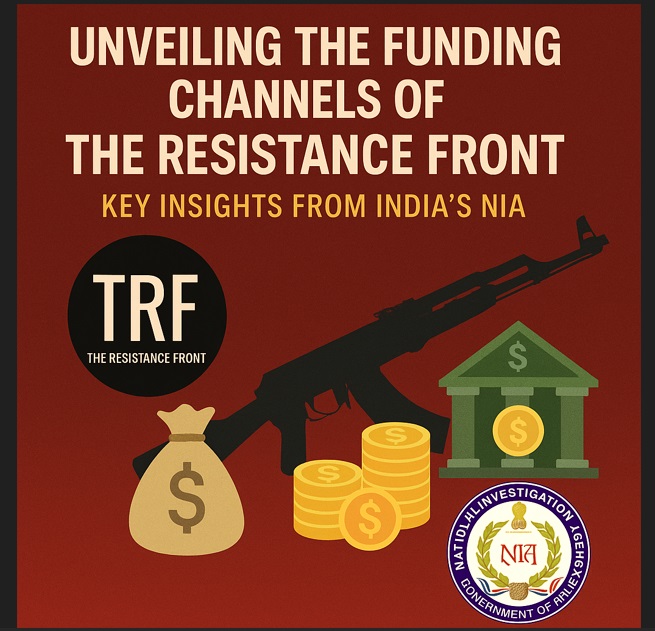Investigations Uncover TRF’s International Financial Backing
In a significant development in the ongoing battle against terrorism in India, the National Investigation Agency (NIA) has made alarming revelations regarding the financial backing of The Resistance Front (TRF), a proxy group affiliated with the Pakistan-based terror organization Lashkar-e-Taiba (LeT). This group has been held responsible for the tragic killing of 26 innocent tourists in the recent Pahalgam attack, an incident that has shaken the nation. The investigation into the TRF’s funding has uncovered intricate connections to terrorist funding channels stretching across various countries, including Pakistan, Malaysia, and several Gulf states.
The NIA’s inquiry involved a meticulous examination of a staggering 463 phone calls that were traced back to individuals linked with anti-India sentiments and extremist supporters. These findings point toward a well-coordinated network facilitating the flow of money into the TRF, which has proven crucial for their terror operations. The NIA’s findings have underscored the seriousness of the situation, particularly as the organization exploits these funds to perpetuate violence and unrest in the region.
Dissecting the Evidence: Financial Trails and International Complicity
Through detailed analysis, the NIA determined that approximately ₹9 lakh in funding was funneled to the TRF through Yasir Hayat, a resident of Malaysia. Furthermore, investigators discovered ties to Sajid Mir, one of the most wanted terrorists associated with Lashkar-e-Taiba, highlighting the complexity and international reach of terror financing networks. The NIA has successfully retrieved vital evidence through various means, including mobile data, social media chats, banking transactions, and call records, which paint a clearer picture of the TRF’s funding sources.
This breakthrough emerged following a series of successful raids conducted by the NIA in Srinagar and Handwara, located in the volatile Jammu and Kashmir region. During these operations, officials uncovered essential documents regarding the TRF’s foreign funding operations, providing solid leads on the accounts and parties involved. These revelations will play a pivotal role in aiding India in presenting a robust case before the Financial Action Task Force (FATF).
As these investigations unfold, they are expected to bolster India’s ongoing efforts to highlight Pakistan’s insufficient action against terror financing, with the ultimate goal of re-designating Pakistan on the FATF’s gray list. Such a designation would impose stricter economic scrutiny on Pakistan, complicating its access to foreign aid and exacerbating its current economic challenges.
Political Implications: India’s Stance on Terror Financing
The timing of this investigation’s revelations could not be more crucial. Following the devastating Pahalgam attack on April 22, sources have indicated that India possesses ample evidence linking Pakistan to terror financing activities. A strategic comparison could be drawn to Pakistan’s previous standing on the FATF gray list, where it faced significant repercussions in terms of economic aid and scrutiny. This heightened monitoring had occurred due to an observation that Islamabad lacked a comprehensive and coordinated risk-based approach toward terror financing.
Having previously found itself on the FATF gray list in June 2018, Pakistan had been removed from it in September 2022 after claiming to have executed a recommended action plan. However, the persistent allegations of financial misconduct raise questions about the integrity of the measures Pakistan asserted it had implemented. Speculations are rife around the possibility of Pakistan reverting to the FATF’s gray list, with sources suggesting that such a designation would critically hinder its economic prospects, potentially leading to worse inflation and a deteriorating debt situation.
The Broader Implications of Terror Financing
The ramifications of the NIA’s findings extend beyond mere financial transactions; they illuminate the broader complexities of international terrorism and the intricate web of financial support that sustains these operations. The evidence presented paints a troubling picture of a transnational network that not only supports terrorism but also undermines regional stability, making it imperative for nations to collaborate in combating these efforts.
By effectively identifying and addressing these funding channels, India aims not only to tackle the immediate threats posed by groups like the TRF but also to contribute to a more robust international framework for addressing terror financing. The calls for international cooperation resonate throughout the narrative, as the fight against terrorism requires collective action on a global scale.
According to the latest insights from the NIA, the evidence collected will be crucial for international deliberations and discussions regarding Pakistan’s role in harboring and financing terrorism. As per the report by NDTV, Indian officials have voiced their determination to leverage these findings to reinstate Pakistan on the FATF’s gray list, which could have far-reaching implications for its economy.
In the meantime, the focus remains on ensuring that these investigations continue to unfold with transparency, allowing India to present a compelling case on the international stage. The findings of the NIA could pave the way for stricter regulations on terror financing and enhanced monitoring mechanisms, ultimately contributing to a safer and more secure environment for all.
For further insights into the implications of terrorist financing, you may find the articles on JSTOR and United Nations illuminating.
Strengthening the Fight Against Terrorism: A National and Global Imperative
As India navigates this precarious landscape, the call for greater international cooperation against terror financing has never been more urgent. The NIA’s recent revelations are not merely national concerns; they resonate on a global scale, as nations collectively grapple with the implications of unchecked terrorism funding. The path forward hinges on collaborative efforts aimed at closing the funding channels that sustain terrorism and enforcing stricter economic repercussions for those nations that turn a blind eye to these activities.
The challenge remains daunting, yet with sustained efforts and enhanced international collaboration, significant progress can be made towards a future free from the scourge of terrorism.


